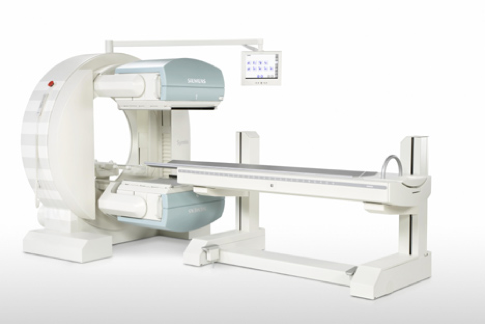Scintigraphy
What is scintigraphy?
Nuclear medicine is a discipline that combines both diagnostic and therapeutic activities.
Scintigraphy is the basic examination for diagnostic activity.
It makes it possible to explore all the organs and especially the skeleton, brain, kidneys, the thyroid, etc.
To know more about the main types of examinations, click here.
How does it work?
The examination takes place in several stages depending on the region to be explored.
- Radiolabelled molecules that emit radiation and are specific to the organ to be studied are administered, usually intravenously, but sometimes orally.
- After the injection, it is often necessary to wait a certain time before the images are produced.
- You are the encouraged to drink and empty your bladder frequently during this wait to promote urinary elimination.
- During the scintigraphy, you will be asked to remain still. Before capturing the images, you will have to remove all metal objects (jewellery, keys, belt, ...).
- For most examinations, you will be lying down during the capturing of images.
- The duration of the captures depends on the type of examination (it can vary from a few minutes to more than one hour).
- The exact procedure for your examination will be communicated to you by the staff of the unit.
The device used is called a "gamma camera". It is silent and does not touch you, even if it moves very close to you to get good quality pictures.
The device is open: you do not have to enter a tunnel.
Can I come with a friend or relative?
They are welcome. However, as in every unit located in controlled areas, they will not be able to accompany you to the examination room.
It is not advisable to come with young children unless they are the ones undergoing the examination.
If the examination concerns a child, the child may be accompanied by a parent for the duration of the examination.
Young children can keep their comforter.
Is the examination dangerous?
No, because you will only be exposed to a very small amount of radioactivity.
The radiation received is comparable to that of an x-ray examination.
The irradiation produced by this injection is comparable to irradiation of natural origin (sun, earth, house) for one year.
Who can benefit from a scintigraphy?
Everyone, even infants or the elderly.
If you are pregnant or if your period is late, you should report this to the staff prior to injection.
If you are breast-feeding, also report it. You will be notified if you need to stop breastfeeding and for how long.
Is there any special preparation for this examination?
Generally no, unless you were warned when making an appointment.
In most cases, you can eat and drink as usual, and take your medication before you come.
Do not hesitate to inform the nuclear medicine unit of the treatment you are following.
What documents do you need to bring?
You will bring your request for examination as well as any administrative documents that allow you to prove your identity (identity card, passport, ...)
What will happen after the examination?
You will be able to resume all your activities, including your work.
You will be advised to drink plenty of water. The little radioactivity that remains after the examination is naturally eliminated.
It is simply advisable to avoid close (less than 1m) and prolonged (more than 30 minutes) contact with others, especially young children and pregnant women during the rest of the day.
What happens to the examination images and report?
- If your prescribing doctor is a Chirec member, they can consult your results in the computer system a few hours after your examination.
- If your prescribing doctor is not a Chirec member, they will receive your results by mail or electronically.
| For further information, do not hesitate to contact our units | |
|---|---|
| Edith Cavell | 02/434.41.70 |
| Park Leopold | 02/434.59.70 |
| Braine-l'Alleud | 02/434.93.52 |
| Basilique | 02/434.21.89 |
| St-Anne St-Remi | 02/434.38.42 |
